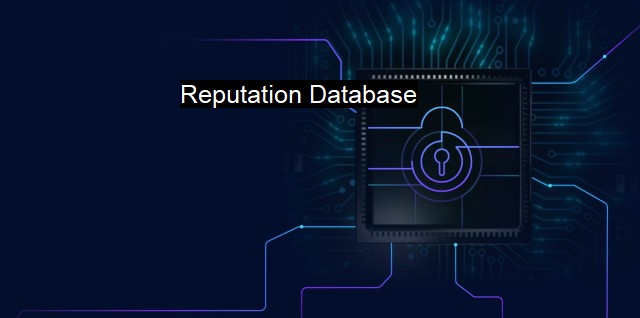What is Reputation Database?
Ensuring Cybersecurity and Privacy: The Importance of Reputation Databases in Protecting Online Activities
Reputation Database, within the context of cybersecurity and antivirus software, is a comprehensive system that essentially profiles the threat landscape by determining the credibility and safety of applications, users, and other entities. It functions based on input data received continuously about various entities from multiple sources, helping identify suspected threats or malicious content. This has become an essential component of robust digital security infrastructure, especially given the exponentially increasing number of security threats worldwide.To conceive the idea of a Reputation Database, it helps to appreciate the sheer scale of potential applications, web pages, and possible changes in functionality that occur continually. A security team using simple rules or manually analyzing every newly emerging threat, file, or content is neither feasible nor practical. This is where the concept of the Reputation Database enters. It is essentially an automated system that revolves around analytics and evaluation, aiding in detecting potential threats or unsafe content.
The primary purpose of a Reputation Database in cybersecurity is to evaluate different elements against available data, ranking them according to their level of security threat. Each element in question – be it a file, a website, or a piece of software – is evaluated based on various criteria. This can include its origin, its creators, associated behaviors, and other relevant factors. Through collated data, the Reputation Database effectively provides a reputation score or a safety grade. Higher reputation scores imply fewer security threats, thereby earmarking the file or the software as safe for use.
A Reputation Database's effectiveness lies in its potential to learn and evolve continually according to new inputs and developments. The database operates by amassing large amounts of data from around the world and across multiple platforms where users interact and transact, then integrating this data to make more accurate, reliable security evaluations.
Sophisticated Reputation Databases harness machine learning and artificial intelligence technologies to cater to this need effectively. Machine learning algorithms examine the gathered data, learn from it, and adjust the system to make more reliable predictions regarding incoming threats. The application of artificial intelligence compounds this by enabling the database to discern patterns in the vast data sets. The system keeps advancing, growing more effective with each interaction, literally learning to function more accurately.
The working of a Reputation Database becomes particularly crucial in antivirus applications. Most antivirus software today utilizes a variety of scanning techniques to identify potential threats. In addition to diagnosing known viruses from a database, antivirus applications these days also present heuristic capabilities, behavioral analysis, and deep learning technology as an integrated part of the system.
Reputation Databases form the driving force behind real-time and predictive scanning capabilities in these antivirus applications. They provide invaluable insights into the type of detected software, its behavior, and how it interacts with other system aspects. With millions of new pieces of content, apps, and software pouring into the web world daily, these capabilities and contributions of Reputation Databases are indispensable for maintaining robust cybersecurity standards.
Every file and digital entity processed through the system hits the Reputation Database, which examines the content against its amassed data. Depending on its nature, behavior, and other factors, the system sails it through or tags it as a potential threat, triggering actions like quarantine, deletion, or further rigorous scans.
The Reputation Database has genuinely transformed the multi-layered cybersecurity landscape. Despite its efficiency, though, it is essential to appreciate that a Reputation Database, like any other technology, isn't without limitations. Its effectiveness often depends on the expertise employed in its implementation, continuous adjustments, and life-long learning. Hence, while Reputation Databases contribute significantly to cybersecurity, they must be coupled with user awareness, prudent practices, and other layers of protection, to collectively provide comprehensive digital security.

Reputation Database FAQs
What is a reputation database in cybersecurity?
A reputation database is a collection of information about domains, IP addresses, URLs, and other internet resources that have been analyzed for their trustworthiness and security risk.Why is a reputation database important for antivirus software?
Antivirus software can use the reputation database to quickly identify and block known malicious websites or downloads, helping to prevent infections before they occur.How is reputation data collected and analyzed?
Reputation data can be collected through a variety of methods, such as user reports, automated analysis, and threat intelligence feeds. The data is then analyzed and scored based on various factors, including the resource's history of malicious activity and the reputation of the organization that owns the resource.Can a reputation database be used to improve cybersecurity beyond antivirus software?
Yes, a reputation database can be used in other cybersecurity applications, such as firewalls, intrusion detection systems, and email filters, to protect against a variety of attacks and threats.| | A | | | B | | | C | | | D | | | E | | | F | | | G | | | H | | | I | | | J | | | K | | | L | | | M | |
| | N | | | O | | | P | | | Q | | | R | | | S | | | T | | | U | | | V | | | W | | | X | | | Y | | | Z | |
| | 1 | | | 2 | | | 3 | | | 4 | | | 7 | | | 8 | | |||||||